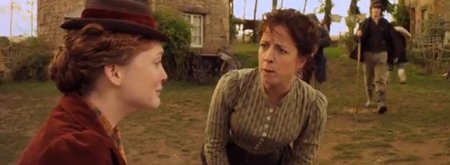Lark Rise to Candleford
It doesn’t take usually take too much persuasion to get me to try a new box set of DVDs, but I have to say that I was a little sceptical when series one of Lark Rise to Candleford was proposed as Christmas viewing by well-meaning relatives. It looked very twee and slow moving compared to series seven of 24 and I wondered if I’d be able to stay awake with all the extra turkey.
Good Clean Enjoyment from the BBC!
However, after a few episodes, I was hooked. A month later, we are now halfway through the BBC’s showing of the second series which was launched by a feature length Christmas special on December 23. So, unless you are ready to work through the stacked episodes on BBC iplayer, you may need to do some catching up through DVDs yourself.
The story is set in the mid-1890s and follows Laura Timmins, a young girl from a poor family in working class Lark Rise whose mother has found her a position in the Post Office of the well-to-do town of Candleford. There she works for her cousin, the stalwart postmistress, Dorcas Lane, played by Julia Sawalha (best known as Saffron in Absolutely Fabulous). At the end of the 19th century, the Post Office would have operated as a centre of town life, particularly with the introduction of the electronic telegraph machine, which gave instant communication with other towns around the country. Dorcas is a pillar of the community, a woman of wisdom and integrity who solves many complicated social problems, although her humanity shines through her wit and gracious poise in the face of criticism and misunderstanding.
The series is based on a trilogy of autobiographical novels written by Flora Thompson about her childhood growing up in rural Oxfordshire. They have long been highly regarded by historians for their details of daily life and the beauty of the surrounding countryside. But now they have reached wider audiences and the BBC has picked a winner in dramatising them and broadcasting at the peak Sunday evening 8.00 pm slot. Both series have drawn audiences averaging at 6.5 million per episode, full of appreciation for the quality and reserved humour of the screenplays.
Super-clean TV
One blog on the fansite pointed out that, after Frank Skinner’s Panorama programme complaining about the prolific use of swearing on TV, it looked as though broadcasters really did believe that audiences wouldn’t pay them any attention if they weren’t modern enough in their expletives. Yet the popularity of Lark Rise proves that there are plenty of people who react very well to super-clean TV, not least teenagers in our youth group.
The programmes are also worth watching because of their treatment of the role of faith and the church in the 1890s. The script writers may show their modern sensibilities in the sympathetic support for the more liberal characters but there is also a lovely and sensitive portrayal of those characters with faith. The fourth episode of the current series deals with the death of the Reverend and the reaction of his daughter, Miss Ellison, to the return of her estranged younger brother at the funeral. His atheist views and support of Darwin led his father to drive him away, and it seems initially as though Miss Ellison feels the same way about his rejection of Christianity. Yet it emerges that she is most bitter about the fact that he left her alone to care for her father. She eventually acknowledges that she needs forgiveness too and seeks him out for reconciliation.
Although the character is initially presented as hypocritical, it is clear by the end of the programme that there is far more to her behaviour than self-righteous piety, which seems to be the usual fate for Victorian Christians in period drama. Even Thomas, the postman, who quotes psalms and verses more freely than Dot Cotton, is rounded out in his abashed and endearing wooing of Miss Ellison. He is supported by the sentiment of the script when he refuses to deliver post on a Sunday because it is the Lord’s day.
Respect Across Class
The lovely thing about the series is that, in the end, everyone is forgiven. The most severe feelings are expressed and the most desperate and heartrending situations played out, but the endings always work out in the way that they should. People are made to see reason and respect one another, most significantly across classes.
As always with TV, the goggles of discernment are essential equipment when responding to Lark Rise. It is, of course, a pity that the centre of the community is not the church, a place that seems as dead as many rural parishes today, but the rosy tint that the programme puts on the ‘olden days’ is deeply pleasurable for lots of right reasons too.
© 2009 Evangelicals Now
This item was originally published in the March 2009 edition of Evangelicals Now. It is published here by the kind permission of the editors. For a free sample issue or to subscribe to Evangelicals Now, click here.



